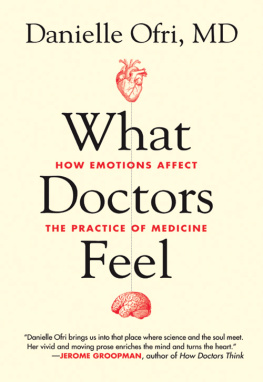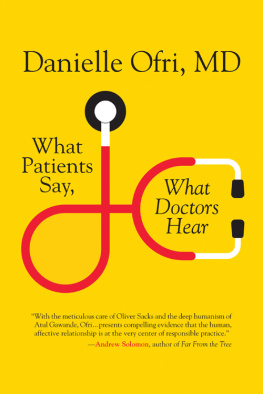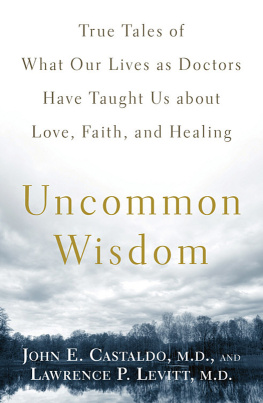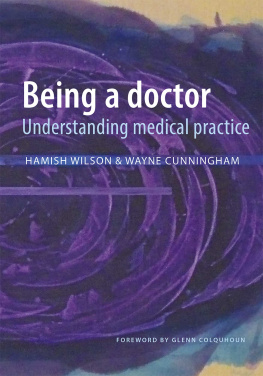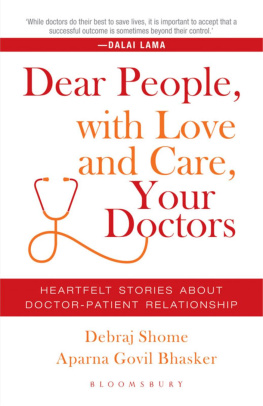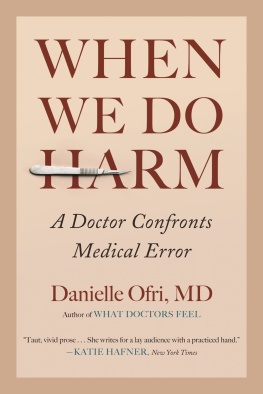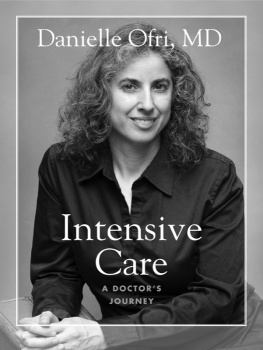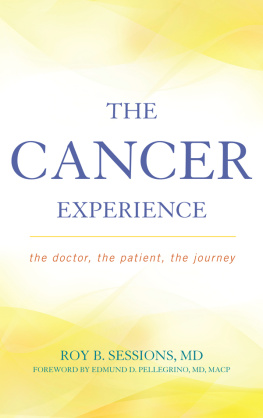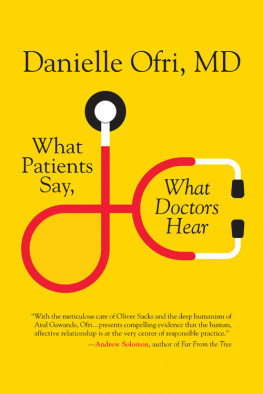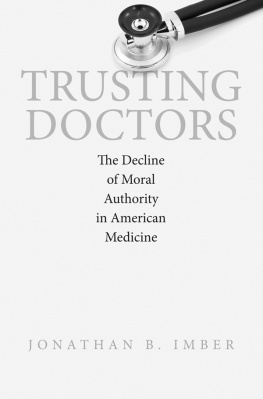
Also by Danielle Ofri
Intensive Care: A Doctors Journey (an e-book original)
Singular Intimacies: Becoming a Doctor at Bellevue
Incidental Findings: Lessons from My Patients
in the Art of Medicine
Medicine in Translation: Journeys with My Patients

For Naava, Noah, and Ariel
INTRODUCTION
Why Doctors Act That Way
The experiences of medical training and the hospital world have been extensively documented in books, television, and film. Some of this has been probing and incisive, and some has been entertaining nonsense. Much has been written about what doctors do and how they frame their thoughts. But the emotional side of medicinethe parts that are less rational, less amenable to systematic interventionhas not been examined as thoroughly, yet it may be at least as important.
The public remains both fascinated and anxious about the medical worlda world with which everyone must eventually interact. Within this fascination is a frustration that the health-care system does not function as ideally as people would like. Despite societal pressures, legislative reforms, and legal wrangling, doctors dont always live up to these ideals. I hope to delve beneath the cerebral side of medicine to see what actually makes MDs tick.
One might reasonably say, I dont give a damn how my doctor feels as long as she gets me better. In straightforward medical cases, this line of thinking is probably valid. Doctors who are angry, nervous, jealous, burned out, terrified, or ashamed can usually still treat bronchitis or ankle sprains competently.
The problems arise when clinical situations are convoluted, unyielding, or overlaid with unexpected complications, medical errors, or psychological components. This is where factors other than clinical competency come into play.
At this juncture in our societys history, nearly every patientat least those in the developed worldcan have access to the same fund of medical knowledge that doctors work from. Anyone can search WebMD for basic information or PubMed for the latest research. Medical textbooks and journals are available online. The relevant issuethe one that has the practical impact on the patientis how doctors use that knowledge.
There has been a steady stream of research into how doctors think. In his insightful and practically titled book How Doctors Think, Jerome Groopman explored the various styles and strategies that doctors use to guide diagnosis and treatment, pointing out the flaws and strengths along the way. He studied the cognitive processes that doctors use and observed that emotions can strongly influence these thought patterns, sometimes in ways that gravely damage our patients. Most [medical] errors are mistakes in thinking, Groopman writes. And part of what causes these cognitive errors is our inner feelings, feelings we do not readily admit to and often dont even recognize.
Research bears this out. Positive emotions tend to be associated with a more global view of a situation (the forest) and more flexibility in problem solving. Negative emotions tend to diminish the importance of the bigger picture in favor of the smaller details (the trees). In cognitive psychology studies, subjects with negative emotions are more prone to anchoring biasthat is, latching on to a single detail at the expense of others. Anchoring bias is a potent source of diagnostic error, causing doctors to stick with an initial impression and avoid considering conflicting data. Subjects with positive emotions are also prone to bias; they are more likely to succumb to attribution bias. In medicine, this is the tendency to attribute a disease to who the patient is (a drug user, say) rather than what the situation is (exposure to bacteria, for example).
This is not to say that positive emotions are better or worse than negative emotionsboth are part of the normal human spectrum. But if you consider the range of cognitive territory that doctors traverse with their patientsgenetic testing, ordinary screenings, invasive procedures, ICU monitoring, and end-of-life decisionsyou can appreciate how the final outcomes can be strongly influenced by a doctors emotional state.
Neuroscientist Antonio Damasio describes emotions as the continuous musical line of our minds, the unstoppable humming. This basso continuo thrums along while doctors make a steady stream of conscious medical decisions. How this underlying bass line affects our actions as doctorsand the net effect on our patients (and on doctors when we ourselves become patients!)is what intrigues me.
By now, even the most hard-core, old-school doctors recognize that emotions are present in medicine at every level, but typically this is lumped in with the catch-all of stress or fatigue, with the unspoken assumption that with enough self-discipline, physicians can corral and master these irritants.
The emotional layers in medicine, however, are far more nuanced and pervasive than we may like to believe. In fact, they can often be the dominant players in medical decision-making, handily overshadowing evidenced-based medicine, clinical algorithms, quality-control measures, even medical experience. And this can occur without anyones conscious awareness.
It could easily be argued that doctors are no more emotionally complex than accountants, plumbers, or the cable-repair guy, but the net result of doctors behaviorlogical, emotional, irrational, or otherwisecan have life-and-death consequences for patients, which is to say, for all of us.
We all want excellent medical care for ourselves and our families, and wed like to assume that the best care comes from the doctors with the best training, or the most experience, or the best U.S. News & World Report rating. However, the myriad effects of emotional underpinnings can confound all of these factors.
Despite this, the conventional stereotype that doctors are fairly emotionless continues to maintain its hold. Many trace this back to the eminent Canadian physician Sir William Osler, often considered the father of modern medicine for such revolutionary ideas as whisking medical students out of the staid classroom and bringing them to the bedside to learn medicine by examining actual patients. The current educational system of clinical clerkships and residency training is largely attributed to Osler, as are hundreds of snappy quotations. His continuing influence is apparent in the scores of diseases, endless libraries, and numerous medical buildings, hospital wings, societies, and awards that bear his name.
On May 1, 1889, Dr. Osler stood before the graduating medical class at the University of Pennsylvania and delivered a valedictoryand now canonicalspeech entitled Aequanimitas. He stressed to these fledgling doctors that a certain measure of insensibility is not only an advantage, but a positive necessity in the exercise of a calm judgment.
While Osler may not have created these attitudes, he neatly encapsulated the general feeling about how doctors should behave. Though he did warn against hardening the human heart, the stereotype of the detached, coolheaded physician springs from this idea of equanimity.
Popular culture has embodied this. Television doctors from Ben Casey to Gregory House are detached from their patients, lauded for their technological and diagnostic acumen. Even the selflessly idealist doctors (in Arrowsmith, Middlemarch, and
Next page
